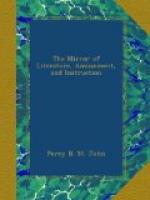Mr. Moxon’s is a modest little octavo, of 76 pages, which may be read between the first and last arrival of a Christmas party. As a specimen, we subjoin the following:—
Hail, Christmas! holy, joyous time,
The boast of many an age gone by,
And yet methinks unsung in rhyme,
Though dear to bards of chivalry;
Nor less of old to Church and State,
As authors erudite relate.
If so, my harp, thou friend to me,
Thy chords I’ll touch right merrily—
Then a fire-side picture of Christmas in the country:—
The doughty host has gather’d round
Those most for wit and mirth renown’d,
And soon each neighbouring Squire will
be
With all the world in charity—
Its cares and troubles all forgetting,
Good-humour’d joke alone abetting.
’Tis good and cheering to the soul
To see the ancient wassail bowl
No longer lying on its face,
Or dusty in its hiding place.
It brings to mind a day gone by,
Our fathers and their chivalry—
It speaks of courtly Knight and Squire,
Of Lady’s love, and Dame, and Friar,
Of times, (perchance not better now,)
When care had less of wrinkled brow—
When she with hydra-troubled mien,
Our greatest enemy, the Spleen,
Was seldom, or was never seen.
Now pledge they round each other’s
name,
And drink to Squire and drink to Dame,
While here, more precious far than gold,
Sits womanhood, with modest eye—
Glances to her the truth unfold,
She shall not pass unheeded by.
T’was woman that with health
did greet,
When Vortigern did Hengist meet—
’Twas fair Rowena, Saxon maid,
In blue-ey’d majesty array’d,
Presented ’neath their witching
roll
To British Chief the wassail bowl.
She touch’d to him, nor then in
vain,
He back return’d the health again.
Thus ’tis with feelings kind as
true
They drink the tribute ever due,
Nor would they less, tho’ truth
denied it,
Their love for woman would decide it.




